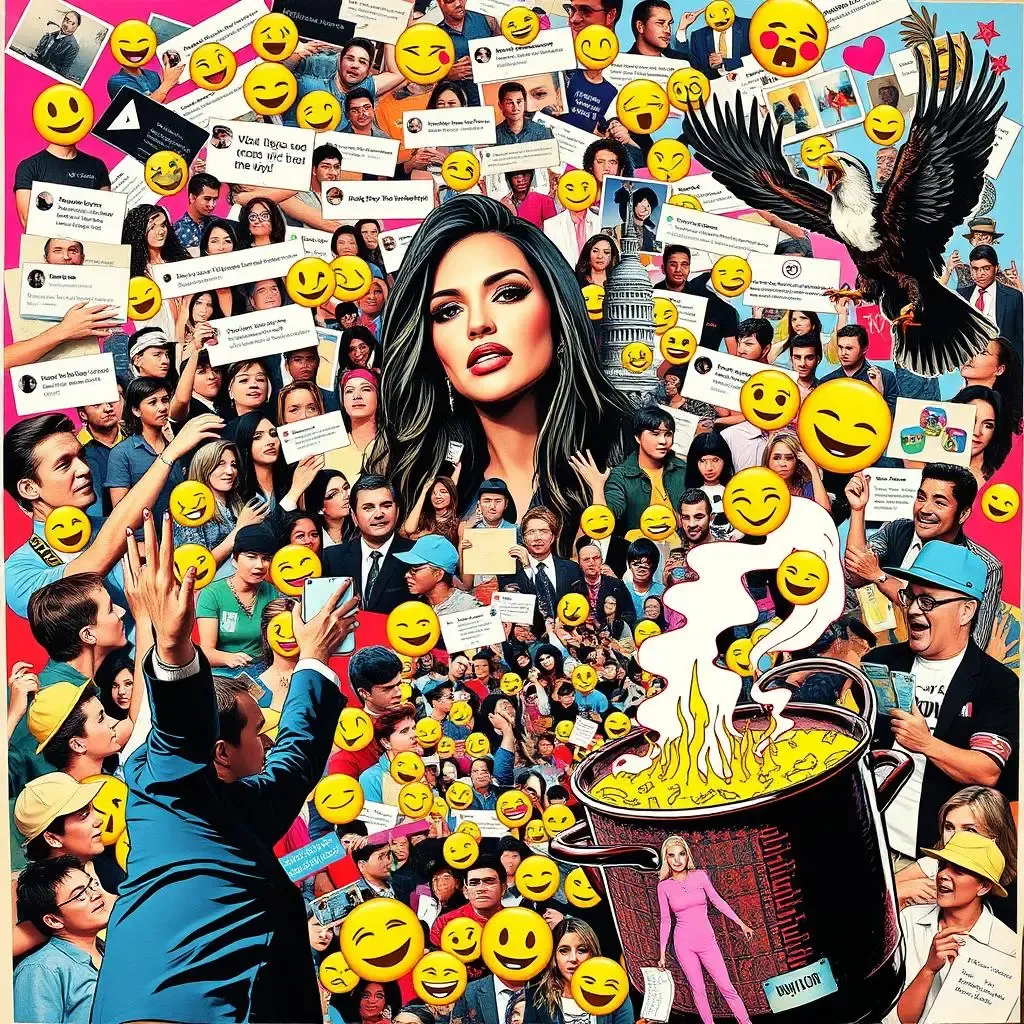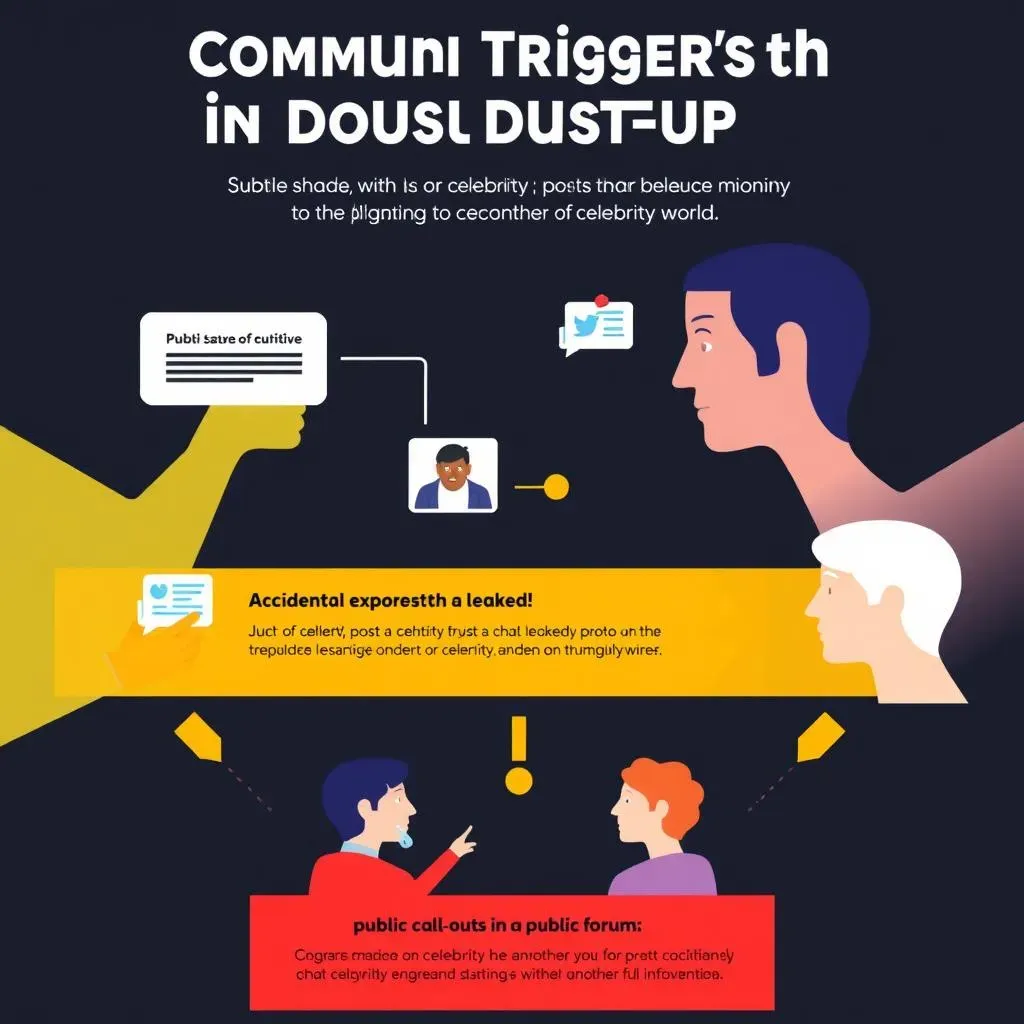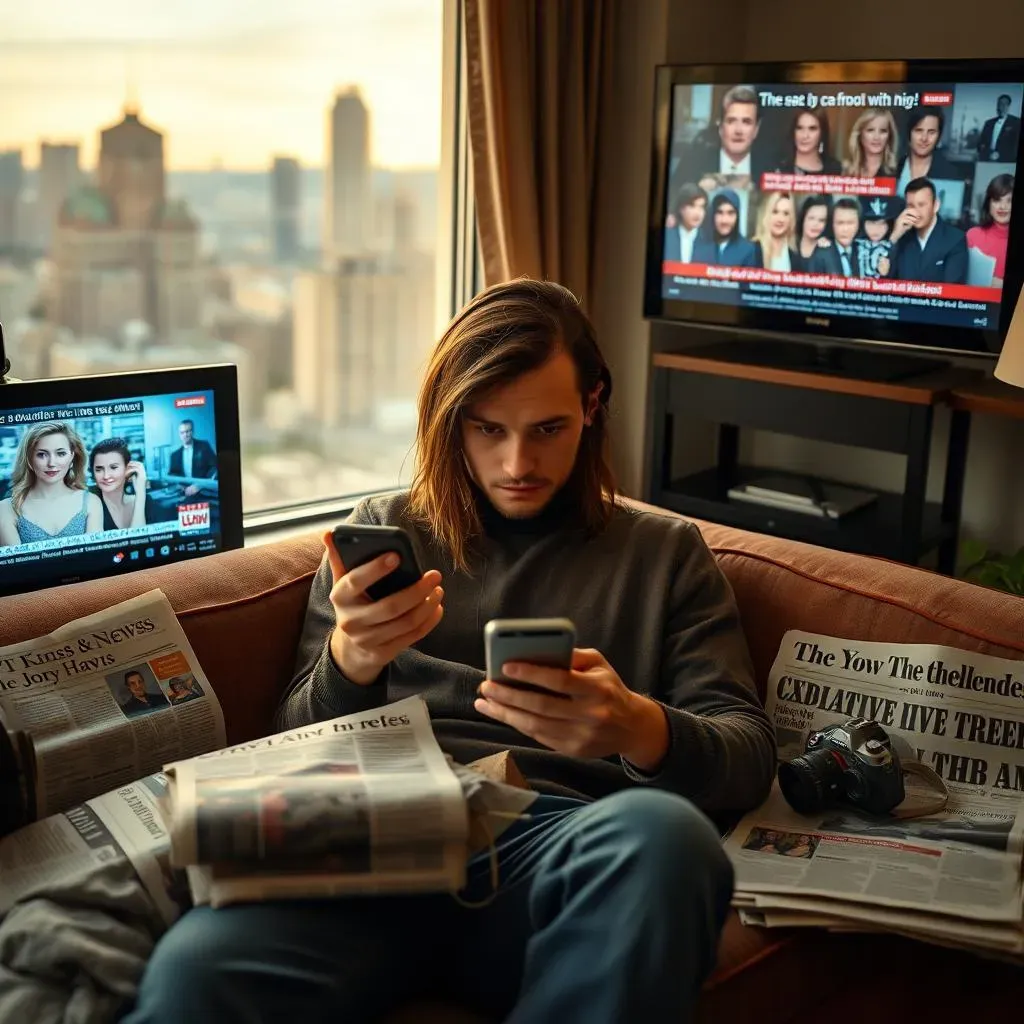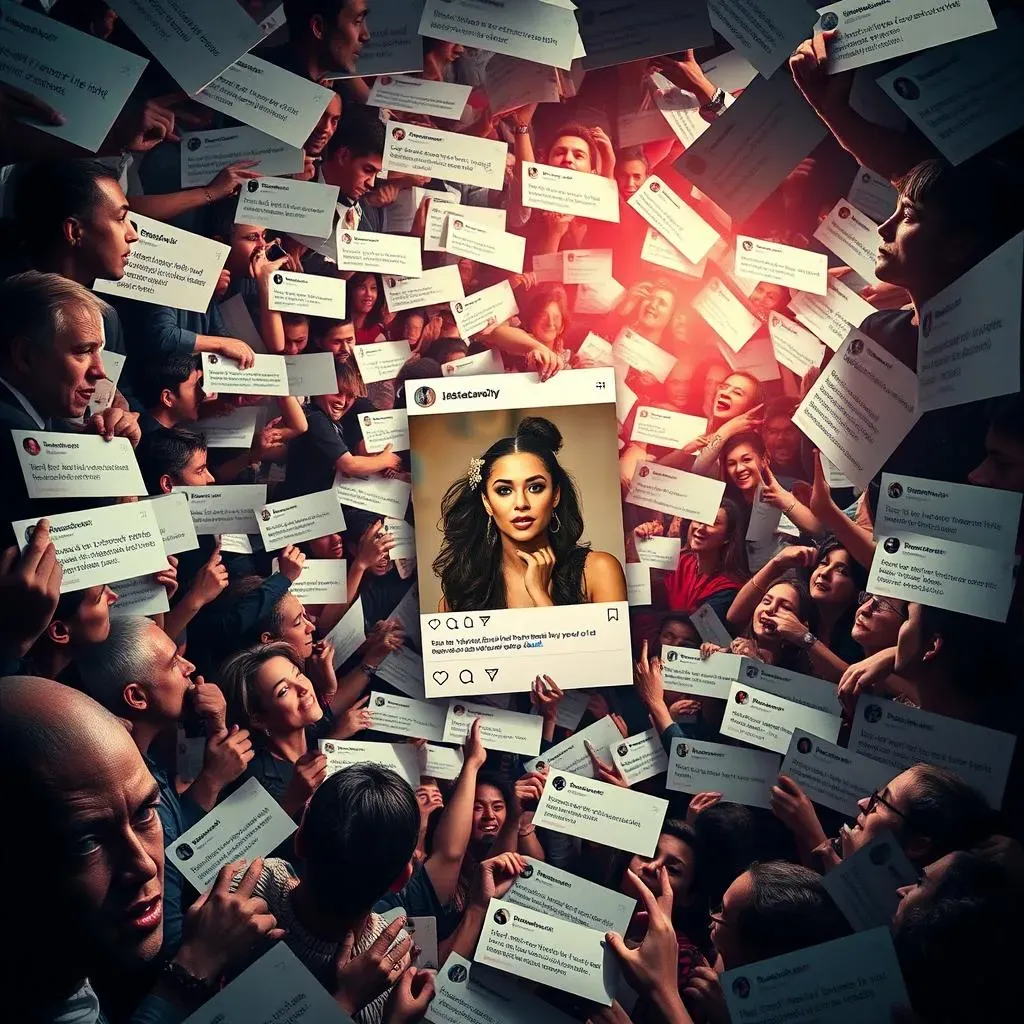Table of Contents
Ever scrolled through Instagram and felt like you've stumbled into a soap opera? That's the world of celebrity Instagram drama for you, where a single post can ignite a wildfire of speculation, accusations, and fan frenzy. It's a digital stage where public figures often play out their lives, sometimes with explosive results. This article isn't about taking sides or adding fuel to the fire, but rather to give you a map to navigate this often chaotic landscape. We'll explore what usually kicks off these online spats, the common threads that run through them, and how you can stay informed without getting sucked into the vortex. We'll also consider the bigger picture: how all this drama affects fans and shapes our culture. So, whether you’re a casual observer or a dedicated follower of celebrity shenanigans, buckle up, and let's get to the bottom of this.
The Anatomy of Celebrity Instagram Drama

The Anatomy of Celebrity Instagram Drama
The Spark: What Ignites the Fire?
Okay, so what actually kicks off these digital dust-ups? It's rarely one thing, more like a perfect storm of factors. Think of it as a recipe for disaster. You've got the main ingredient: a celebrity with a massive following and a public image to maintain (or, you know, completely trash). Then you add a dash of perceived shade – maybe a cryptic post, a subtweet that's not-so-subtle, or a photo that seems designed to provoke. Sprinkle in some fan speculation, and BOOM, you've got the first sparks of a full-blown drama.
It's like watching a pot boil. The initial heat might be something small, a seemingly innocent comment or a photo with a hidden meaning. But then the pressure builds as fans and media outlets start dissecting every little detail. Before you know it, the pot is overflowing with accusations and counter-accusations. The whole thing feels like it's designed to create a buzz, whether it's intentional or not. It's a wild ride, and sometimes, it's hard to look away.
The Players: Who's Who in the Drama?
It's not just the celebrities themselves who are involved. You've got a whole cast of characters playing their parts. There are the 'stans,' the die-hard fans who will defend their idol to the death (or at least until the next drama starts). Then there are the 'haters,' who seem to thrive on negativity and are always ready to pounce on any perceived misstep. And let's not forget the media outlets, who are always on the lookout for a juicy story to drive clicks. They often amplify the drama, turning a small spark into a roaring inferno.
You also have the 'lurkers,' those of us who watch from the sidelines, maybe with some popcorn, fascinated by the spectacle. We might not comment, but we're definitely part of the audience. It's like a real-life drama unfolding in front of us, and it's hard not to get a little caught up in it. It's a complex ecosystem, with each player contributing to the overall chaos. And just when you think it's all over, someone throws another log on the fire.
“The internet has turned us all into commentators, even when we have nothing useful to say.” - Some random internet user.
Decoding the Digital DustUps: Common Triggers

Decoding the Digital DustUps: Common Triggers
Subtle Shade: The Art of the Cryptic Post
Alright, so you've got the stage set, the players are in position, but what actually makes the drama pop off? It often starts with what I like to call "subtle shade." This is when a celebrity posts something that isn't directly aggressive, but it's loaded with implied meaning. Think a picture with a pointed caption, a quote that seems suspiciously relevant, or a song lyric that's clearly aimed at someone. It's like they're throwing a verbal grenade, but with a wink and a smile. This type of post is designed to get people talking, and boy, does it work. It's the internet equivalent of a dramatic whisper in a crowded room, and everyone strains to hear what was said.
It's not always about direct confrontation, it's the little digs that really get under people's skin. It's like a passive-aggressive art form, where the goal is to provoke a reaction without actually saying anything outright. And the beauty of it is, the celebrity can always play it off as innocent if called out. "Oh, I just liked the song," they'll say, as the internet explodes with theories. It's a masterclass in manipulation, and it's a cornerstone of celebrity Instagram drama.
The "Accidental" Exposure: When Secrets Come to Light
Another big trigger is the "accidental" exposure. This is when a celebrity's private life spills onto the public stage. Maybe it's a leaked DM, a photo they thought was private, or a video that was never meant to see the light of day. These moments are like a sudden spotlight shining on the messy parts of their lives, and it's usually not pretty. The fans go wild, the media pounces, and the celebrity is left scrambling to do damage control. It's like a car crash, you know you shouldn't look, but you just can't help yourself.
These exposures can range from embarrassing to downright scandalous. Whether it’s a questionable text message, an unedited photo, or an off-the-cuff comment, once it's out there, it's out there for good. The internet never forgets, and these moments can haunt a celebrity's reputation for years. It's a reminder that even in the digital age, privacy is a fragile thing, especially for those who live in the public eye.
Drama Trigger | Description | Example |
|---|---|---|
Subtle Shade | Cryptic posts with implied meaning | A vague quote about betrayal after a breakup |
"Accidental" Exposure | Private info leaked to the public | Leaked DMs showing a celebrity badmouthing someone |
Public Call Outs | Direct accusations and confrontations | A celebrity publicly calling out another for stealing their idea |
Public Call-Outs: Direct Confrontation
And then, there's the direct call-out. This is when a celebrity skips the subtle shade and goes straight for the jugular. It’s a public accusation, a direct confrontation, and it usually gets messy, fast. This can be anything from calling out another celebrity for stealing their idea, to addressing rumors head-on, or directly challenging a perceived enemy. It's like a public duel, and the internet is the arena. It is a bold move, and it's a guaranteed way to get people talking. No more coded messages, just straight-up confrontation.
When a celebrity chooses to engage directly, it often escalates the situation. Fans are forced to pick sides, and the drama goes from a simmer to a full boil. It's a risky move, because it can backfire spectacularly, but it's also a way for a celebrity to take control of the narrative. This type of drama is like watching a high-stakes poker game, and everyone is waiting to see who will fold first. It is a real showdown, and it’s hard to look away.
Navigating the Noise: Staying Informed Without Getting Involved

Navigating the Noise: Staying Informed Without Getting Involved
The Art of the Casual Observer
So, you're fascinated by the celebrity Instagram drama, but you don't want to get caught in the crossfire? Smart move. It's like watching a train wreck – you can be curious without having to be on the train. The key is to be a casual observer, not a participant. This means consuming the information without getting emotionally invested. Don't pick sides, don't send angry DMs, and definitely don't get into arguments in the comments section. Remember, it's entertainment, not a real-life conflict you need to solve. It is okay to be a little nosy, but you don't have to be a busybody.
Think of it like watching a reality TV show. You might have opinions, you might even find it entertaining, but at the end of the day, it's not your life. Keep that distance, and you'll be able to enjoy the show without getting dragged into the drama. It's about having a healthy level of detachment. Don't let the drama consume you, just observe it from a safe distance. After all, they're not paying you to care this much.
Fact-Checking Frenzy: Separating Truth from Fiction
In the age of social media, misinformation spreads like wildfire. It's easy for rumors and speculation to be presented as facts, especially when it comes to celebrity Instagram drama. That’s why it's crucial to be a responsible consumer of information. Don't believe everything you read, no matter how juicy it sounds. Before you share or comment on something, take a moment to fact-check it. Look for reliable sources, cross-reference information, and be wary of anything that seems too sensational. Remember, a lot of what you see online is carefully curated, or outright fake. It's your responsibility to be a critical thinker and not blindly believe every claim.
It's like being a detective. You need to look for clues, analyze the evidence, and come to your own conclusions. Don't let the emotions of the moment cloud your judgment. Ask yourself questions: Is this source credible? Is there any bias at play? Is this information consistent with what I already know? It's okay to be skeptical, in fact, it's encouraged. The best way to navigate the noise is to be informed, not just entertained. “The truth is rarely pure and never simple.” - Oscar Wilde
Tip | Description |
|---|---|
Stay Detached | Observe without getting emotionally invested. |
Fact-Check | Verify information before sharing. |
Limit Exposure | Take breaks from social media. |
Setting Boundaries: Limiting Your Exposure
Finally, remember that your mental health is more important than any celebrity feud. It's easy to get sucked into the endless scroll of drama, but it's crucial to set boundaries for yourself. Take breaks from social media, mute accounts that are constantly posting inflammatory content, and don't be afraid to step away from the screen. There is a whole real world out there, and it’s much more interesting. It's okay to be curious, but it's not okay to let it take over your life. Remember you have your own life to worry about, not theirs.
Think of it like a diet. Just like you wouldn't binge on junk food all the time, you shouldn't binge on drama. It's okay to indulge a little, but it's important to have a balanced intake. Set time limits for your social media use, engage in other activities that bring you joy, and prioritize your well-being. The world of celebrity Instagram drama will keep spinning, whether you’re watching or not. It is okay to unplug, you won’t miss that much.
The Impact of Celebrity Instagram Drama on Fans and Culture

The Impact of Celebrity Instagram Drama on Fans and Culture
The Parasocial Playground: When Fandom Gets Intense
Okay, let's talk about the fans, because they're a huge part of this whole equation. Celebrity Instagram drama can create a really intense parasocial relationship – that's when fans feel like they know these celebrities personally, even though they've never met. It's like watching a movie character and feeling super invested in their life, but on steroids. This can lead to some pretty extreme behavior, with fans taking sides, attacking those they see as the "enemy," and even harassing the celebrities themselves. It’s like they've become characters in a real-life soap opera, and the fans are desperately trying to influence the plot. It is a weird form of connection, and it's not always healthy.
This parasocial connection can blur the lines between reality and fantasy. Fans might feel personally hurt or betrayed by a celebrity's actions, as if they were a friend or family member. This can lead to an unhealthy obsession, where a fan's self-worth becomes tied to the actions of their idol. It's easy to get caught up in the drama, especially when it feels like you are part of it, but it’s important to remember that these are real people with real lives. It's okay to be a fan, but it's not okay to let it consume you. It's a fine line, and it's easy to cross it without even realizing it.
The Echo Chamber Effect: How Drama Fuels Itself
And then there’s the echo chamber effect. When a drama starts, fans often flock to online communities to share their opinions and theories. This can create an echo chamber, where people are only exposed to information that confirms their existing biases. It's like everyone is shouting their opinions into a megaphone, and no one is actually listening to the other side. This can make the drama even more intense, as people become more entrenched in their positions. It's a breeding ground for polarization, where common sense often goes out the window. It is like a big online party, where everyone is trying to be the loudest one.
This echo chamber can make it harder to see the bigger picture. People get so caught up in their own narratives that they forget that there are other perspectives. It becomes a self-perpetuating cycle, where the drama feeds on itself, and the truth becomes lost in the noise. It's like a runaway train, and it's hard to stop it once it gets going. That's why it’s important to step outside of the echo chamber and try to see the drama from a more objective point of view. It’s okay to have opinions, but it’s not okay to let them blind you to the truth. “The problem with the world is that the intelligent people are full of doubts, while the stupid ones are full of confidence.” - Charles Bukowski
Impact | Description |
|---|---|
Parasocial Relationships | Intense, one-sided connections with celebrities. |
Echo Chambers | Online communities reinforcing existing biases. |
Shifting Culture | Influence on trends and social norms. |
The Cultural Impact: Setting Trends and Shaping Norms
Finally, let's not forget the cultural impact of all this. Celebrity Instagram drama isn't just entertainment, it also influences trends and shapes social norms. The way celebrities behave online can have a ripple effect on their fans, particularly younger ones. It can normalize certain behaviors, like public shaming, online feuding, and even cancel culture. This can have a real impact on how people treat each other online and in real life. It's like a giant social experiment, and we're all part of it. It is shaping the way we interact, and it’s not always for the better.
The constant exposure to drama can also desensitize people to conflict and negativity. It can become something that is expected and even accepted. This can lead to a more cynical and combative online environment, where empathy and understanding are in short supply. It's a big responsibility, and it's important to be aware of the impact our online actions can have on others. We might think it's just harmless fun, but it can have real consequences. It's a reminder that the internet is not a separate world, it’s just an extension of the one we live in.